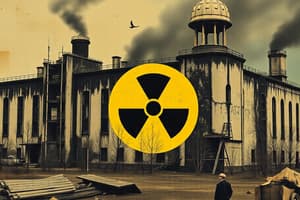Podcast
Questions and Answers
What was the primary mission of the three men during the Chornobyl disaster?
What was the primary mission of the three men during the Chornobyl disaster?
- To evacuate the facility
- To release a valve in contaminated water (correct)
- To establish a containment barrier
- To repair the reactor cooling system
What surprising outcome occurred after the actions of Ananenko, Bezpoalov, and Baronov?
What surprising outcome occurred after the actions of Ananenko, Bezpoalov, and Baronov?
- They were recognized as national heroes immediately
- They all died shortly after the incident
- They survived despite initial reports of their death (correct)
- They received a financial reward for their actions
What common misconception do people have about heroes, according to Andrew Carnegie's findings?
What common misconception do people have about heroes, according to Andrew Carnegie's findings?
- Heroes often act for personal gain
- Heroes see their actions as normal behavior (correct)
- Heroes believe they act bravely
- Heroes seek public recognition for their actions
What instinct do heroes often override according to the content?
What instinct do heroes often override according to the content?
What was a major consequence of the Chornobyl disaster for emergency responders?
What was a major consequence of the Chornobyl disaster for emergency responders?
How many people has Andrew Carnegie's Hero Fund recognized for acts of heroism since 1904?
How many people has Andrew Carnegie's Hero Fund recognized for acts of heroism since 1904?
What distinguishes the actions of the three men from typical human behavior in crises?
What distinguishes the actions of the three men from typical human behavior in crises?
What does the phrase 'ignore their survival instinct' imply about heroic individuals?
What does the phrase 'ignore their survival instinct' imply about heroic individuals?
Flashcards
Chornobyl Suicide Squad
Chornobyl Suicide Squad
A group of three men who volunteered to risk their lives to stop the Chornobyl nuclear disaster by manually releasing a valve in contaminated water.
Chornobyl Disaster
Chornobyl Disaster
A nuclear power plant disaster in Ukraine in 1986 that released a large amount of radioactive material into the environment, exposing many people to dangerous levels of radiation.
Survival Instinct
Survival Instinct
An instinctive response in humans to protect their own life and well-being.
Heroes
Heroes
Signup and view all the flashcards
Hero Fund
Hero Fund
Signup and view all the flashcards
Unassuming Heroism
Unassuming Heroism
Signup and view all the flashcards
Study Notes
Chornobyl Disaster and Heroic Actions
- A nuclear power plant in Chornobyl, Ukraine, released deadly radioactive material in 1986.
- The plant risked exploding, and the only solution was to release a valve in toxic water.
- Robots couldn't access the water, thus requiring human intervention.
- Alexi Ananenko, Valeri Bezpoalov, and Boris Baronov volunteered for the dangerous task.
- They entered the radioactive water, releasing the valve and preventing a nuclear meltdown.
- This action saved hundreds of thousands of lives.
- The men are known as the Chornobyl Suicide Squad, though they survived.
- The disaster resulted in thousands of deaths from radiation exposure.
Understanding Heroism
- The heroic actions of Ananenko, Bezpoalov, and Baronov are puzzling.
- The human instinct is to survive; heroes defy this.
- This contrasts with examples of parents risking their lives for children, which could be seen as survival instinct.
- Andrew Carnegie and the Hero Fund have recognized many acts of heroism.
- Carnegie noted heroes often don't see themselves as such.
- Heroes generally perceive their actions as typical, risking personal safety for others.
Studying That Suits You
Use AI to generate personalized quizzes and flashcards to suit your learning preferences.
Description
Explore the heroic efforts of Alexi Ananenko, Valeri Bezpoalov, and Boris Baronov during the Chornobyl disaster in 1986. Their brave actions prevented a catastrophic meltdown, saving countless lives in the process. This quiz delves into the nature of heroism and the human instinct for survival.




